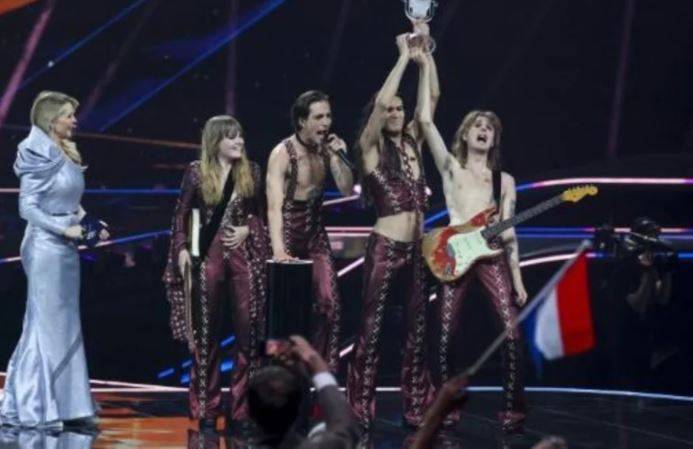Italy won the 2021 Eurovision Song Contest, finishing ahead of France and Switzerland, thanks to the powerful performance of the rock band "Måneskin." The event was organized as a message of hope to a world overwhelmed by a health crisis. This year's Eurovision returned with strict health measures and a limited audience in Rotterdam, Netherlands, after the previous year's edition was canceled for the first time in the competition's history due to the COVID-19 pandemic.
France took second place with Barbara Pravi's song "Voilà," which fell short of gifting her country the Eurovision trophy after a 44-year wait for a win. Switzerland secured third place. The Italian band Måneskin delivered an energetic and thrilling performance, with the four members wearing leather outfits and utilizing light effects. Upon receiving the trophy, lead vocalist Damiano David said, "We want to tell all of Europe and the world that rock and roll never dies."
The exceptional health situation forced the organizers of the contest, usually watched by tens of millions annually, to develop a new format for the event after the cancellation of the 2020 edition. Following their victory, the Italian band expressed that the event had provided relief to Europeans after a difficult year dominated by the pandemic. They stated, "We are truly grateful for the opportunity to participate in this huge event. It really is unbelievable." Additionally, the band's bass guitarist, Victoria De Angelis, noted that this win could send a message of hope to Italy, one of the countries hardest hit by the coronavirus.
Thousands of Eurovision fans, who usually play a vital role in the event by attending in large numbers to cheer on participants and raise flags, were denied the chance to attend due to travel restrictions from the pandemic. About 3,500 spectators, all of whom were tested negative for COVID-19 beforehand, were allowed to attend the semi-final and final performances, representing 20% of the Ahoy Arena's capacity in Rotterdam.
Måneskin, consisting of one female and three male members, secured Italy's third win in this competition, which typically does not attract rock bands. After social media spread images of him bowing his head on the table during the final, lead singer Damiano David denied rumors that this was due to drug use at the time, as many suggested. He confirmed during the press conference after the win, "I do not take drugs. Please, guys, don't say that. I do not use cocaine, please don't say that."
The name "Måneskin" means "moonlight" in Danish, Victoria De Angelis's native language. The song they performed at Eurovision, titled "Zitti e buoni," won them the grand prize at the 71st Sanremo Music Festival in 2021. The band, which reflects various musical influences from pop, reggae, and funk, was formed in 2016 in Rome by De Angelis, Damiano David (vocals), Thomas Raggi (guitar), and Ethan Torchio (drums), all of whom were still teenagers.
The band rose to fame after participating in the 2017 "X Factor" with a new song titled "Chosen," which allowed them to sign their first professional contract with Sony Music. They achieved platinum record status twice thanks to this work. In recent years, the band has released several singles, including "Torna a casa" in 2018, which garnered around 110 million views on YouTube.
Throughout the contest, participants remained in a "special bubble" to avoid the risk of COVID-19 infection and underwent daily testing. Nevertheless, several COVID-19 cases were reported among participating delegations, including Iceland, whose representatives had to remain in their hotel and participate in the contest through pre-recorded videos. The previous year's winner, Dutch artist Duncan Laurence, was also unable to perform his winning song "Arcade" during the final in Rotterdam after testing positive for COVID-19.
As is customary, the Eurovision event featured distinctive performances from artists representing minorities or seeking to convey messages to the audience. The song representing Cyprus narrated the story of a woman who falls in love with the devil, provoking widespread anger from the powerful Orthodox Church on the Mediterranean island, while a feminist-themed song from a Tajikistani-born Russian singer sparked discontent among conservative factions in Russia.




